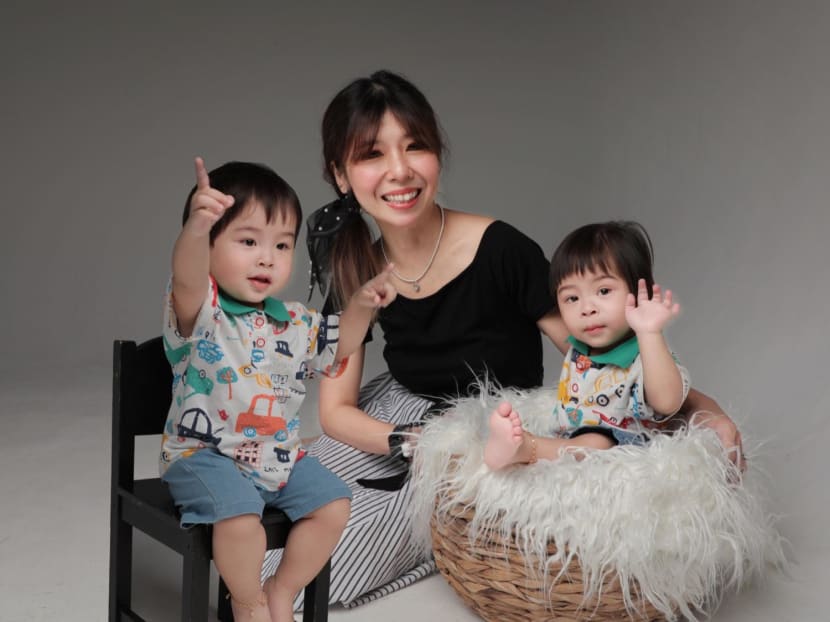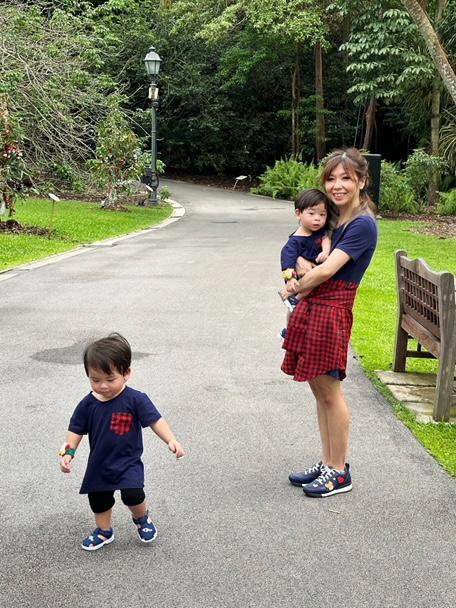‘I now realise I cannot control everything in my life’: A mum on how IVF changed her view of motherhood
Daphne Aw went through five rounds of egg retrieval and suffered miscarriages before getting pregnant with her twins on the final try. She tells CNA Women how her experience has changed her views of being a mum, in the start of this Mother’s Day series about unconventional motherhood.

Daphne Aw conceived her twin boys on her final in-vitro fertilisation embryo transfer. (Photo: Daphne Aw)
When Daphne Aw embarked on her journey to have children, it was difficult. The road to pregnancy was made more challenging with Hashimoto’s disease, an autoimmune condition where one’s thyroid does not produce sufficient thyroid hormones.
This resulted in three failed rounds of non-medicated intrauterine insemination (IUI). It then led to investigations involving numerous doctor’s appointments, blood tests, ultrasounds and injections to manage her hormone levels.
In late 2016, Aw and her husband, embarked on in-vitro fertilisation (IVF) and went through five rounds of egg retrieval and nine transfers before she fell pregnant with their twins.
Asher and Aster were conceived in 2020 on her final try. The boys are now two years old and are Aw’s first successful live births as she had suffered miscarriages earlier.
Miscarriages are common with IVF – up to 50 per cent of IVF transfers run that risk. After egg retrieval, and fertilisation with sperm in the lab, the most nail-biting moments are after the fertilised egg or embryo is transferred to the woman’s uterus.
Here is where the couple waits to see whether the embryo implants itself on the uterus lining. If successful, one will be pregnant. If not, one will experience a period like normal.
Even with pregnancy, if the embryo or foetus does not develop properly, it can also end in a miscarriage. There are no specific causes to this however, embryo health, maternal age and other reproductive history and lifestyle factors play a part.
A NEW MINDSET AFTER IVF – LEARNING TO APPRECIATE THE SMALL THINGS
The five-year journey to having her children left an indelible impression on her and made an even bigger impact on her outlook to life. Aw, who is in her 40s, said: “I used to seek a logical answer to all that happens. A black-and-white, ‘cause and effect’, if you will.
“I now realise I cannot control everything in my life. If things aren’t working out, I am able to move on, and be at peace with the situation. The key is knowing there is strength in letting go.”
She also feels a general sense of gratitude, even for the small things. “I am appreciative of all the challenges that motherhood brings. I find myself thankful for the small things, more often than I would otherwise.
“For example, if I have had a particularly tiring day with my children, I still feel fortunate to have that opportunity to be tired.
“In fact, on the last transfer, my husband and I made peace with that fact that we may never be parents if it wasn’t successful. The alternative ending that we may have had then, has never left my mind – I remember this every time I look at my boys.”
A DIFFERENT WOMAN AFTER IVF
Aw said she has changed after her IVF experience – and for the better. “It has helped me progress as a person. I’m stronger, more resilient, not just as a woman but as a sister, a friend, a partner and most of all, as a mother.
“I listen with empathy to others around me. And knowing that I’ve had the privilege to have had several rounds of IVF, this is not lost on me. We are incredibly lucky.”

The hardest part of her IVF journey was not the seemingly endless medical appointments, scans and jabs but the miscarriages she suffered. The grief from her miscarriages allowed her to identify with others in the same situation and have more compassion – not just to women in the throes of assisted reproduction but to others as well.
The arrival of her twins allowed her to process her sorrow and come to terms with her losses. “I still think of our babies, what they would have been like – there is no filling the holes that they left. But after my twins came, my heart now holds a special place for the ones we lost.”
Even with her children, she has no expectations. She finds herself more present and more patient as a parent.
Said Aw: “I don’t need my children to be a certain way or achieve any specific milestones. I just want them to be who they are, be happy and know that I love them, I fought for them, and I am supportive of them always.”
SUPPORT DURING THE IVF JOURNEY
While Aw had shared her arduous fertility experience with close family members who offered their unwavering support, she believed those dark times strengthened her marriage and having the right support system allowed her “to cross paths with the best of people”.
“My husband is my solid rock – faithful and strong. His calm demeanour was what I needed when we were in the thick of a storm. At times, my self-consuming grief didn’t let me acknowledge his, yet he set his own feelings aside to be my crutch.
“While he couldn’t take on the procedures, ops and subsequent injections himself, he was beside me in the trenches, and that gave me the courage to get back up and try again with each failure.”
Aw attributes Fertility Support SG, a local group where women share their resources, knowledge and experience with other women who are embarking on their own fertility journey, as a source of inspiration.
“They work hard to create a safe space where women can connect and share. Our individual journeys may differ, but we share the same emotional, physical or financial challenges of achieving that same dream of having our child.”
She added: “The IVF process takes a heavy mental toll, as much as it does a physical one. Many of us have kept our fertility struggles a secret, choosing to endure the stress alone. It can be isolating but it doesn’t have to be.
“Ultimately, with IVF, it is not a race but a marathon. Mental health is just as important as your physical health.”
More unconventional motherhood stories:
CNA Women is a section on CNA Lifestyle that seeks to inform, empower and inspire the modern woman. If you have women-related news, issues and ideas to share with us, email CNAWomen [at] mediacorp.com.sg.












